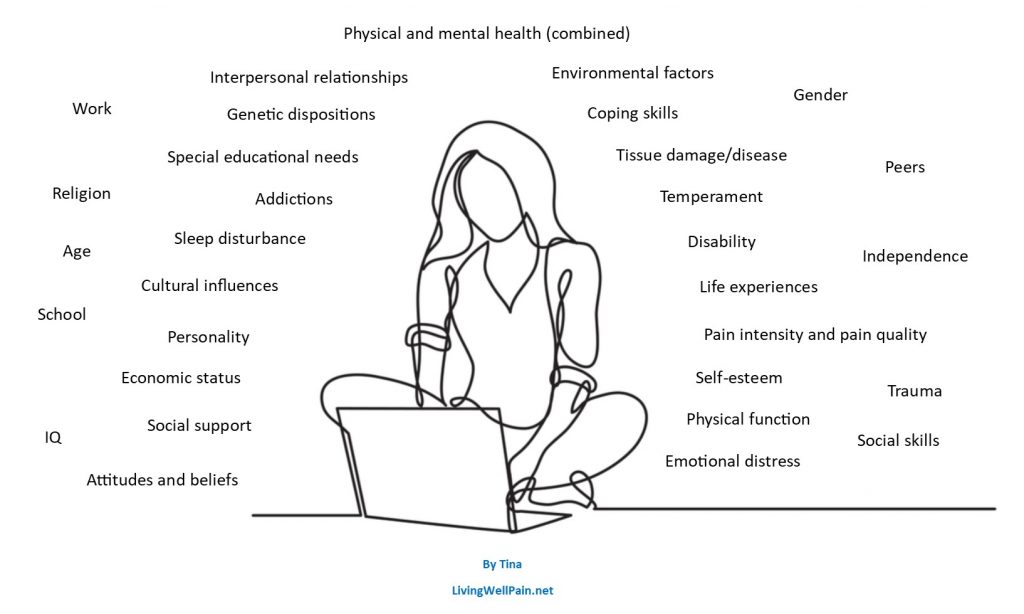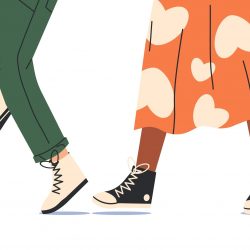I have experienced pain from the moment I was born. For example, as a child I fell off my bike and grazed my knee, as a teenager I fell through a glass door cutting my wrist, and as an adult I experienced bumps, bruises and paper cuts.
As well as injuries I have experienced the pain of earache, toothache and a collapsed lung. Until recently I associated ‘pain’ with either a physical injury to my body, or an illness. When the injury healed, or I recovered from the illness, then the pain would go away.I grew up with little idea how complex the experience of pain really is.
The start of my persistent pain
In the summer of 2008, I experienced a manual handling injury. A disc in my back prolapsed and compressed one of my nerve roots causing severe sciatica symptoms. I was in a huge amount of pain and could barely walk. Sitting down was excruciatingly painful and altogether I was in a great deal of difficulty. I was taken by ambulance to hospital where I stayed for 5 days.
I expected, as I’m sure most people would in my situation, that my back would ‘heal’ and that the pain would go away. After all, my pain had always gone away following injuries in the past. Unfortunately, that didn’t happen, and ever since that injury I have lived with daily pain. My pain isn’t as bad as those early days, but it is still invasive and at times disabling.
Understanding pain can be helpful
I have been fortunate that I have been helped to understand my persistent pain condition, and self-manage my pain, by a skilled physiotherapist. I have learnt that my experience of pain is unique to me, and that there are a range of things that I can do in my daily life to reduce my experience of pain, and to live well with pain.
I have learnt to understand the complex nature of persistent pain which has not only helped me live a life at peace with pain, but also through this understanding to adapt and adjust my life in order to live well with pain. Living with daily pain is not always easy!
What is pain?
I have no idea when I experience ‘pain’ if it is the same as when someone else does. Just like I have no idea when I feel ‘fear’ whether that is the same experience others feel. Or maybe taste, hunger or smell.
I don’t think scientists agree on, or even really know, what pain is or how and why we experience it.
Until science has more answers I choose to simply think of pain as ‘an unpleasant experience’.
Is my ‘injury’ my only pain factor?
I know that I have a ‘damaged’ nerve root in my back which is the main ‘cause’ of my sciatic pain. If I had a magic wand and could completely repair that nerve root and injury site, then I am fairly sure that my sciatic pain would disappear. Unfortunately, magic wands don’t exist.
I know that there are various physical triggers to my sciatic pain. For example, I know that sitting on a hard chair will increase my pain, as will lifting anything heavy, standing still or walking a long way. My nerve root is ‘sensitive’ and becomes easily ‘irritated’. It is definitely a factor in my pain experience.
For several years I assumed that my damaged nerve was the only cause, or factor, of my experience of sciatic pain. Looking back on my childhood and early adulthood experiences of pain this assumption makes complete sense. After all, I could always identify a physical cause for my pain, which when healed resolved my pain. I had never needed to understand more about pain.
However, I now understand that there is much more to my pain experience than just my one ‘injured’ body part. Persistent pain is truly complex. In reality there are many factors, or ingredients, to my pain experience.
My body has changed
I am sure that being in daily pain for several years has caused my body to ‘change’ in response to it. How could it possibly not have done? I don’t fully understand what physical changes have happened in my body since living with persistent pain, but I suspect my nervous system has probably become ‘sensitised’. This has meant that I am sometimes, but not always, more sensitive to pain.
I found the idea that my body could ‘change’ because of my persistent pain quite distressing and worrying at first, but I now accept it as an inevitability. The unseen changes in my body, including my sometimes-increased sensitivity to pain, have become factors, or ingredients, in my pain experience.
Who I am, how I feel, and what I do
I found it relatively easy to appreciate and understand these ‘physical’ aspects of my pain experience. I slowly worked out how to avoid or minimise some pain triggers, for example sitting down, standing still or lifting, and I learnt to accept my sometimes-increased sensitivity to pain.
However for me, perhaps the greatest revelation in my learning to understand my persistent pain has been that who I am, how I feel, and what I do, can also be factors in my pain experience.
I admit it took me a while to start to understand how anything about ‘me as a person’ could possibly be a factor in my persistent pain, but now I do understand it makes complete sense.
I found starting to think about ‘me as a person’ being in any way a factor of my pain difficult. I worried that perhaps I was in some way ‘to blame’ for my pain, or that people might think that the pain was ‘all in my head’. Nothing could be further from the truth. I will try to explain.
The variability of my pain
I am aware that my pain varies from one day to the next, indeed it varies from one hour to the next, and sometimes minute to minute. My pain varies in both intensity and duration.
I noticed that if I was having a difficult time in my life, for example a family member might be in hospital, or I was stressed at work, then my pain experience might be greater. It felt as though my stress levels made it easier for the experience of pain to break through. I also noticed that if I was concentrating hard on something, for example writing this, then my pain may be a little less. It felt as though because my focus was firmly on my writing, there was less room for the pain to take centre stage.
These were my first realisations that there are other things than just my injury that were affecting my experience of pain. This was a breakthrough for me. The door opened to a better understanding of pain and being able to better manage my pain.
Although I can’t do much about my damaged nerve root, or any other ‘physical’ changes I may have incurred, I can do something about my stress levels and about a range of other factors involved in my experience of persistent pain. At last I was empowered to adapt and take back control.
I started to learn and think about other factors that might be contributing to my experience of pain.

Becoming me
I went right back to thinking about who I am as a person, and what has led to me being the person I am.
Everyone is different. We all have a different body, different childhood experiences, different adult experiences, different thoughts, different pain thresholds and different problem-solving skills. Even identical twins aren’t truly identical. They might look the same in their physical appearance, but they aren’t the same ‘people’. They don’t have identical experiences of life and they don’t have identical thoughts and emotions. They don’t have the same experience of pain.
I realised that some of my life experiences have been important factors in making me ‘who I am’. For example, the trauma I experienced as a teenager, becoming Liverpool’s school chess champion, working as a schoolteacher, having pneumonia when I was in my twenties, having my two wonderful children, having my manual handling injury and many, many more.
I thought about identifying these experiences as either negative or positive, but I decided doing that is irrelevant, they are just experiences that have helped shape the person I am today. There is nothing in my background that ‘is to blame’ for my persistent pain, not even the trauma I experienced as a teenager. Even if I’d never experienced that trauma, or any one of my other life events, I would still have persistent pain.
Some elements of ‘who I am now’ are my ability to be resilient, my tendency towards being anxious, my problem-solving capabilities and my workaholic tendencies. My resilience and my problem-solving capabilities help me to live well with pain, whilst my anxiety and workaholic tendencies are probably in some way negative factors to my experience of pain. None of these elements of ‘who I am’ are ‘fixed in stone’. All can be changed over time.
Living day to day
I then started to think about my day to day life. I realised what a complex person I was, and what a complex life I lead! No two months, two weeks, two days, or even two hours are the same for me.
Sometimes my anxiety levels are high and my happiness levels low. Sometimes I am excited. Sometimes I am in a lot of pain and am fearful of the future. Sometimes I am busy and focussed on my work. Sometimes I am bored with nothing to do. My life changes dynamically, as do my emotions, and pain.
Many of my day to day life experiences, pain, and emotions, are linked. For example, if I am working long hours at work, then I will likely be more tired and stressed, and my pain will increase. If I spend the day gardening, then my nerve root will become irritated. I will then experience increased pain, which will make me sad, and maybe more fearful of the future.
I think it is completely understandable to feel sadness when living in daily pain. I was fortunate that I didn’t become clinically depressed, but I can absolutely understand how this can happen. I found that when my emotions were low I was more susceptible to experiencing pain. When happy and relaxed the pain felt a little better.
I began to think about where I live, my financial situation, my family situation, my genetics, my friends, my temperament and my general health. They all have an impact on my day to day life, as well as an impact on ‘who I am’ as a person. They all have an impact, positively or negatively, on my experience of pain.
Of course, my realisation that there are so many factors that make me who I am, and so many factors that might be affecting my daily experience of pain, was important, but to start with it was not entirely helpful to me. I was now faced with a confusing jigsaw puzzle that I didn’t know how to put together in order to minimise my persistent pain and be able to get on better with my life.
Pain contributors and pain improvers
I decided to try and think in more practical terms about what things helped reduce my pain experience, which I call ‘pain improvers’ and what things made my pain worse, which I call ‘pain contributors’. Dividing factors into these two parts is artificial as some things, for example family relationships, could act as both, but it provided me with a way forward in the haze.
I found trying to think about and work out what made my pain worse, or better, quite tricky to start with. It didn’t help that my pain is quite variable and can appear unpredictable.
I worked hard over a period of months to identify a variety of factors which might affect my pain. I believe it was well worth doing. Having a picture in my head of what is likely to make my pain worse, and what is likely to make it better, has enabled me to make choices in my life which have helped me overall live better with pain. These ‘choices’ range from small ones, eg which restaurant to go to depending on whether the chairs are hard or not, to bigger ‘choices’, such as what work is best for me to undertake (I now look for low-stress employment).
I believe having a greater awareness of what is likely to make my pain worse, and what is likely to make it better, has been hugely important in taking back control from pain, and moving my life forward once more. It has enabled me to actively self-manage my pain.
Pain self-management
I have been actively self-managing my pain for a number of years now. Pain self-management supported me when coming off regular pain medications, and has improved my life considerably.
I have found that undertaking pain self-management on a daily basis can be difficult at times, and I certainly don’t profess to be an expert at it. I continue because when I am actively self-managing my pain I am able to reduce my overall pain experience significantly, and I experience a better quality of life. Active pain self-management doesn’t get rid of my pain, and my pain does still flare from time to time, but it certainly helps.
In overall terms I think of my pain self-management situation as minimising my pain contributors, and maximising my pain improvers.
Overall I have found that I need to reduce the physical irritants on my nerve, and optimise as many personal, social, health and emotional factors as possible. I need to consider, and hopefully address, any negative thoughts and beliefs which might be acting as factors in my pain experience. I need to reduce my tendency towards being anxious and build on my resilience and my naturally positive outlook.

Day to day there are many practical pain self-management strategies I employ. I try to avoid stress, get a good night’s sleep, maintain good personal relationships, not lift and carry when I don’t need to, not sit or stand for prolonged periods and use aids to assist me when needed.
In addition, I have tried to explore and address my conscious and subconscious fears about what might cause me pain and my general thoughts and feelings around pain, which inevitably have often been negative. Addressing these has not been easy, but has been worthwhile.
Traumas and life events
Everyone will have experienced a number of traumas or difficult situations in their life. Everyone’s experiences will have been different and everyone will have been affected in different ways.
I have been careful to think through whether there are any ‘unresolved’ elements of the traumas and difficult life events that I have undergone. If I had felt there had been, I like to think I would have taken the opportunity to seek support to resolve them. Although I strongly believe that there is nothing in my past life that has in any way been the cause of my persistent pain, I do think that if I can clear my mind, and optimise my mental wellbeing, that I will have the best chance for my pain to be less.
I am a great believer in the saying ‘What doesn’t break you, makes you grow’. I believe that my life experiences have increased my ability to understand others and have improved my resilience. My strong levels of resilience have been important to me when dealing with my day to day persistent pain.
‘Coping’ and building resilience
Living with daily pain is hard! Wondering how long you will have pain for, and what your future life with pain holds for you, is difficult too!
Pain is not just about how it feels, but also about how it makes me as a person feel. It is about suffering. I believe it is completely normal to feel frustrated, upset and down with pain. I certainly have!
I have found that having a good measure of resilience has helped me cope with the difficulties incurred in a life living with pain. It has enabled me to recover quickly from the day to day difficulties I encounter.
I have found that during particularly difficult times, for example a pain flare, my resilience has dipped. Thankfully resilience is something that can be learned and improved. I intend to keep learning and improving! I intend to accept all the help I can in doing so!
Healthcare support
I have been fortunate to have received skilled healthcare support. Although I live with my pain on a daily basis, and therefore theoretically I am the expert on my pain, I have needed professional support to help me properly understand my situation, and to learn to live better with persistent pain. It took me a while to find the right kind of support that works for me, but it has been well worth doing. It has helped me gain control.
Gaining control
Looking back to the first few years following my injury I don’t think I was in control of my pain situation. I was struggling day to day, not knowing how to improve my situation. Medications weren’t helping sufficiently, and nor were the injections, physiotherapy or surgery. Living with pain was proving very difficult, and I didn’t know where to turn.

However, once I started to understand pain better, and started to recognise what things made my pain worse, and what made it better, and started to actively self-manage my pain, I started to take control of my situation. My pain was no longer in control.
I still couldn’t change the damage from my injury, or reverse the changes that have subsequently occurred in my body, but I could see a way forward to improve my pain. Gaining control of my situation and starting to self-manage my pain improved my life considerably.
Summary
Learning to understand about the complexity of pain has been hugely important to me in terms of living a good and fulfilled life. I still live in persistent pain, and always will, but I’m grateful that through understanding my condition better that I’ve been empowered and enabled to live well with pain.





Hi,
Thankyou for writing this blog. As a physio working in the field of persistent pain, it is fascinating and affirming to read about someone who has taken on active self management strategies for their pain.
I have a keen interest in the ideas behind nerve injuries and their recovery. I am an optimist about the power of the body to heal and change over time, but I have found a certain permenance of thinking around neural injury that seems to fly in the face of adaptation
I am curious about what strategies you use or have tried to reduce the sensitivity of the peripheral neural tissue and where the belief that it will remain damaged forever originates. I hope that this request is not insensitive, I am genuinely interested around the expereince you have had with this,
All the best
Amanda
Hi Amanda
Not insensitive at all, thank you for your interest. There are so many reasons why I believe my sciatic nerve will be damaged for life, and I will remain in some level of pain. I’m not sure this is the best medium to discuss that, but happy if you want to drop me an email via the contact form.
With best wishes
Tina
Indeed, pain is incredibly complex, encompassing physical, emotional, psychological, and social aspects. Understanding its intricacies is vital for effective management. Great observation!